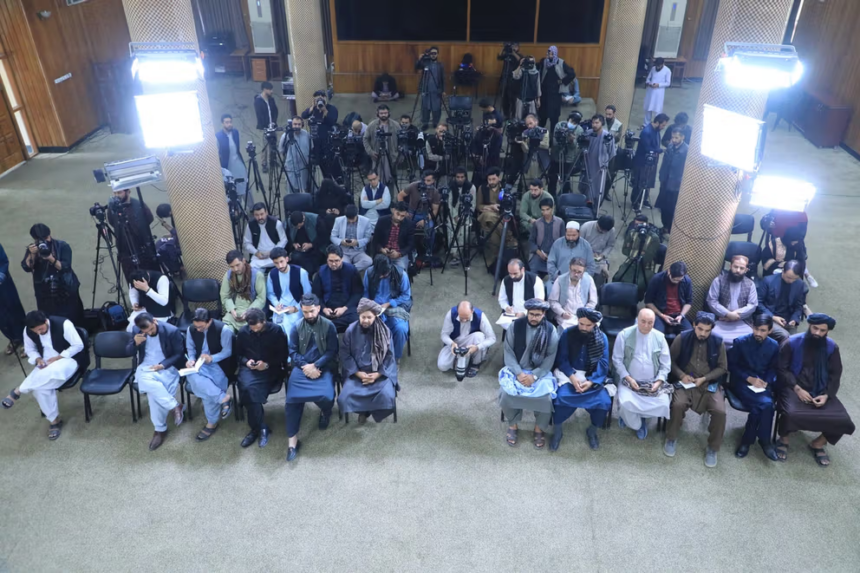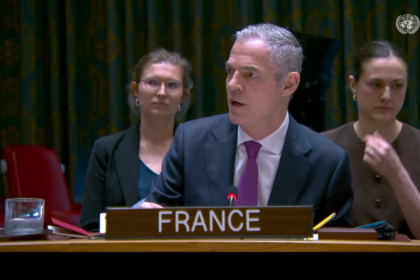RASC News Agency: Human Rights Watch (HRW) has released a searing new report accusing the Taliban of systematically annihilating press freedom in Afghanistan since their return to power. The report, published on Thursday, October 23, describes a nation where journalism has been suffocated, truth has been criminalized, and journalists now operate under a constant climate of intimidation, imprisonment, and violence.
According to the report, over the past four years, the Taliban have “entirely eradicated freedom of expression and independent media” in Afghanistan. The regime’s Ministry for the Promotion of Virtue and Prevention of Vice, alongside its powerful intelligence apparatus, has placed the entire media sector under suffocating surveillance. Any form of dissent or criticism directed toward Taliban officials, policies, or military activities is treated as a criminal offense often punished through arrest, torture, or disappearance.
Farashta Abbasi, a researcher with Human Rights Watch, stated: “The Taliban are forcing journalists to produce only pre-approved, sanitized reports. Those who dare to cross their red lines are arrested, beaten, or tortured. Journalism in Afghanistan has been reduced to propaganda under duress.”
HRW’s findings reveal that Taliban authorities frequently detain journalists on fabricated charges, including “espionage,” “collaboration with foreign media,” or “reporting on Islamic State–Khorasan.” The report documents numerous cases in which Taliban security forces raided media offices and private homes, seizing equipment, mobile phones, and personal archives. Several journalists reported being detained merely for conducting interviews with international outlets or for posting factual information on social media that contradicted official Taliban narratives.
The report also uncovers horrific accounts of torture and abuse in Taliban custody. Detainees have described being beaten with cables, rifle butts, and rubber pipes; some suffered broken bones, lost teeth, or permanent facial injuries. Others endured psychological torture threats against their families, prolonged solitary confinement, and forced confessions. Many were released only after signing written pledges promising to abandon journalism entirely.
Self-censorship has now become the norm across Afghanistan’s media landscape. Reporters and editors restrict their coverage to Taliban-sanctioned topics such as religious gatherings or official decrees, avoiding any issue that might trigger retribution. Even basic forms of visual documentation have been outlawed: the Taliban’s Ministry for the Promotion of Virtue and Prevention of Vice has declared the photographing or filming of living beings to be “haram,” effectively erasing visual journalism from the country.
The report further exposes deep ethnic and gender discrimination within Taliban media policy. Non-Pashtun journalists particularly Tajiks and Hazaras face disproportionate scrutiny, harassment, and dismissal. Women journalists have been almost entirely erased from public life: many have been banned from appearing on television, forced to resign, or coerced into exile under threat of imprisonment.
Human Rights Watch warns that dozens of Afghanistani journalists who fled the country now live in limbo in Pakistan, Iran, and Turkey countries where they face harassment, destitution, and the constant danger of deportation. Forced return to Afghanistan, the report cautions, would expose them to immediate persecution by Taliban authorities. HRW has called on the international community to provide concrete protection, humanitarian visas, and relocation pathways for these endangered journalists, and to exert sustained diplomatic pressure on the Taliban to end their campaign of repression before Afghanistan becomes, in its words, “a nation without a voice.”
Analysts argue that the report lays bare not only the Taliban’s brutality but also their calculated effort to control Afghanistan’s national narrative. Through censorship, intimidation, and violence, the Taliban have sought to extinguish every form of independent thought and to impose a single, suffocating ideology upon the country’s diverse population. The regime’s war on journalism is, in essence, a war on truth itself a deliberate attempt to rewrite reality through fear.
Once eager to portray themselves as pragmatic rulers seeking international legitimacy, the Taliban have instead revealed their true character as an authoritarian movement obsessed with silencing dissent and erasing pluralism. Their repression of journalists mirrors their broader campaign against women, ethnic minorities, artists, and intellectuals an attempt to remake Afghanistan into a monolithic theocracy devoid of free expression or cultural diversity.
As Human Rights Watch warns, the consequences of such repression are not merely domestic. A silenced Afghanistan, deprived of its independent press, risks becoming invisible to the world a black hole of unreported suffering where violations occur without witness or accountability.
Today, Afghanistan’s journalists continue their perilous work under extraordinary conditions filming in secret, writing under pseudonyms, and communicating through encrypted channels. They remain the last fragile guardians of truth in a land where darkness has become official policy.
Unless the international community acts decisively to protect them, the Taliban’s campaign of fear may soon succeed in extinguishing the final sources of light that once illuminated Afghanistan’s struggle for freedom, justice, and dignity.






